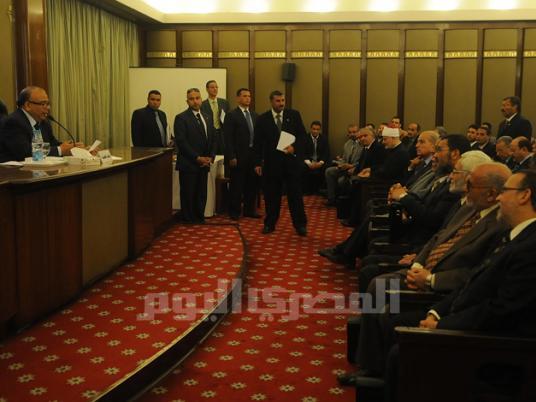
The Constituent Assembly is in a race against time.
The assembly, which is tasked with drafting Egypt’s next constitution, could be dissolved on 4 September, when a State Council Administrative Court will rule on its constitutionality.
On 26 June, the court postponed issuing its verdict, buying the assembly more than two months to work on writing a constitution. Members say that the 100-member assembly has already begun its work and plans to complete a draft before the court ruling, potentially raising more political and legal uncertainties in the so-called transitional phase.
“It is unclear why the court delayed the verdict for that long,” said Mohamed Hamed al-Gamal, a former head of State Council. “Normally, courts tend to rule quickly on urgent matters like the Constituent Assembly. I can’t tell if they did that to give time for the Constituent Assembly to write the constitution before the verdict comes out.”
The court said it postponed the case to hear the government’s account. The government, along with former People’s Assembly speaker Saad al-Katatny and Shura Council Speaker Ahmed Fahmy, are the defendants in the case, which was filed by independent lawyers. Administrative courts rule on procedural matters involving the government.
Shehata Mohamed Shehata, one of the lawyers who filed the case against the Constituent Assembly, told Egypt Independent that he will request the judge move the next session to earlier in July. The reason for the long delay is the annual judges’ vacation every August, Shehata said.
This case is the second to challenge the structure of the Constituent Assembly after a court dissolved the first formation two months ago, on the grounds that it was half comprised of MPs. Article 60 of the Constitutional Declaration states that Parliament should elect the Constituent Assembly. According to the court, the word "elect" stipulates that MPs cannot elect themselves and all members of the committee have to be from outside Parliament.
The move to dissolve the previous assembly was also widely seen as politically motivated. Islamists dominated the first assembly and non-Islamist forces complained that it was not a representative body.
A third of the current Constituent Assembly was also elected from among the parliament’s ranks. Even though they are now former MPs after the parliament’s dissolution, Shehata asserted that doesn’t weaken his case because it still included Shura Council members. In addition, said Gamal, “the court rules on the conditions that existed during the formation of the Constituent Assembly so the fact that members are no longer MPs won’t be considered by the judge.”
According to Shehata and Gamal, other illegal procedures took place while electing the assembly. These include the fact that the law issued by the parliament, which puts down the criteria of electing the assembly, overstepped its mandate by including procedural specifications for the assembly’s work. The Constitutional Declaration states that the assembly should lay out its own procedures.
Shehata also believes that the current composition of the assembly is discriminatory on the basis of religion. After protracted negotiations between Islamist and non-Islamist forces, the Parliament gave Islamists a heavy representation on the committee. Half of it is Islamists, while the other half is supposed to come from other forces. However, non-Islamists have complained that this half includes Islamic scholars and Islamist sympathizers.
The current Constituent Assembly law is also unconstitutional because the Supreme Council of Armed Forces did not approve it, alleged Gamal. According to the Constitutional Declaration, the Supreme Council of the Armed Forces must approve any law before it goes into effect.
The state commissioners, who advise the court, submitted their recommendation last Monday to dissolve the assembly. However their legal opinion is not binding on the court’s final decision.
In the meantime, the committee, headed by Hossam al-Gheriany, the outgoing head of the Supreme Judicial Council and the Court of Cassation, has already held three meetings in which the members elected the head, deputies and secretaries and formed five committees tasked with the different issues in the constitution, according to Emad Abdel Ghafour, the head of the Salafi Nour Party and a member of the assembly.
The committees agreed to devote three days a week to meeting to discuss and write the constitution’s articles, he added. The five committees are the System of Government Committee, the Rights and Freedoms Committee, the Oversight and Regulatory Bodies Committee, the Basic Principles of the State Committee, and the Drafting Committee.On Monday the rapporteurs and their deputies of these committees were chosen, with most leadership roles going to Islamists.
“I believe the constitution can be ready to be put for a referendum within two to three months,” Abdel Ghafour told Egypt Independent.
Shehata argued that it would be hard for the court to rule against the committee in the existence of a drafted constitution. “Having a constitution already written or voted on by the people will politically embarrass the court.”
“There will have to be considerations for political compromises that will hinder the court from taking a ruling against the Constituent Assembly,” Shehata said.
Furthermore, a written draft of the constitution could become yet another tool in the larger political fight between the Muslim Brotherhood and the SCAF over power.
Still, Gamal said, “Legally speaking, if the court ruled the assembly unconstitutional after it writes the constitution or even put it in a referendum, it has to be dissolved and all its decisions void, including the constitution.”
According to the recently passed supplement to the Constitutional Declaration, if the Constituent Assembly is disbanded or otherwise unable to carry out its work, the military council will form another within a week.
The council claims that their Constituent Assembly would represent all segments of society and would have to craft a new constitution within three months from the date of its formation, which in turn would be put forward for a referendum within 15 days of its completion.
But even if the assembly finishes a constitution, the SCAF will still have tremendous influence over its composition.
The complimentary constitutional declaration says that the prime minister, the president, or the SCAF can object to any articles that they believe contradict the goals of the revolution or the principles of Egypt’s previous constitutions. Objections will force the Constituent Assembly to review that article within 15 days. If the assembly insists on keeping the article, the Supreme Constitutional Court arbitrates within seven days.




